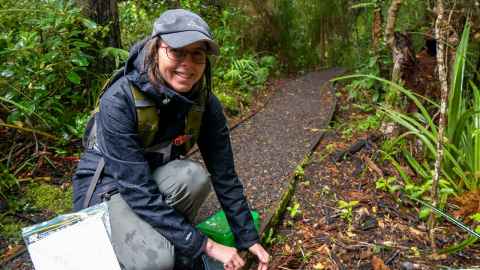Renee Johansen
After completing a PhD in Biology at Manaaki Whenua Landcare Research, Renee now works there on a research programme focused on the plant disease myrtle rust.

“I have been fascinated by biology since high school. It is full of complexity and mystery. When I went to university more than a decade after high school, ecology seemed interesting, accessible, and sits at the interface of biology and another big interest of mine – environmental problems. While my PhD is technically in biology, it’s more of an ‘ecology/biogeography’ PhD.
“My thesis was titled ‘Hidden complexity: exploring the biogeography of dune grass root fungi with next generation sequencing.’ We don’t know much about what fungi are where in the world, especially in non-horticultural environments, even though fungi have big impacts on plant health.
"I looked at the fungi in the roots of dune grasses, comparing what I found in New Zealand, Australia, the UK and the USA using DNA ‘barcodes’. I examined their distribution within dunes, between dunes, between countries in a single plant host, and also looked at what was in an alternate host in each country. It was all-consuming hard work for a few years, but the travel was fantastic, and it was a great opportunity to learn valuable skills in the field and in the lab.
“It’s good to be able to bridge two worlds – the CRI’s
and the universities – it provides more opportunity to access expertise and
equipment you might need to complete your qualification, and can open up more employment opportunities afterwards.
“I felt privileged to be able to undertake part of my PhD at Manaaki Whenua – Landcare Research because I was able to draw on a wide range of expertise and experiences – it was easy to speak with people around the lunch table as well as in more formal settings. I also appreciated having excellent access to lab space and equipment. And it was a great chance to see first-hand what life at a Crown Research Institute (CRI) is like.
“It’s good to be able to bridge two worlds – the CRI’s and the universities – it provides more opportunity to access expertise and equipment you might need to complete your qualification, and can open up more employment opportunities afterwards.
“I’m currently working as a project manager and communications leader for a research programme. This is my first non-research role in the research ‘industry,’ and follows a postdoctoral contract at Los Alamos National Lab in the USA. I’m still learning about the non-research ‘research industry’ opportunities available to me in NZ; but I’m hoping I can continue to draw on my research experience while building management skills over the next few years. I especially enjoy bringing people together to do great work, planning and logistics, mentoring others, and honing communications efforts. Roles that combine these things are a good fit for me!
“During my study I received a University of Auckland Doctoral Scholarship and a Fulbright New Zealand Graduate award. I’m grateful the university allowed me to combine these as the financial support from both was essential to enable me to give my full attention to my PhD, and to not have to work in a part-time job at the same time. In addition to income, my Fulbright exchange to the USA (I was based there for around 18 months at Duke University in North Carolina) also meant I could access resources not available in New Zealand (so money for my project, rather than for me), thanks to collaborators there who were keen to see the project succeed.
"I suppose without that time in the US I still might have gotten a PhD, but it certainly would not have been the same PhD! There would have been no way to pay for the technology required to generate the data I wound up with – at that time it was new, risky, and very expensive. The expertise I could access there were also invaluable, and the connections I made played a big role in helping me secure my postdoctoral contract.
“To students looking to carry out their post graduate study at a Joint Graduate School, I would say consider what you hope to gain from the qualification. I was keen to have the experience of undertaking research and generating new knowledge, but probably should have given more thought to the possible career options afterwards. Although most graduates don’t end up going on to research careers there are lots of alternative careers where the experiences and qualifications you gain from undertaking postgraduate study are valuable. It can be worth learning about these opportunities early on, thinking about what might suit your interests, and thinking about how you might build useful skills outside of core research activities.”
We're always looking for stories to share from our passionate Science students. If you have a story, we'd love to hear from you. Email science-web@auckland.ac.nz.